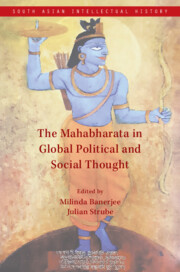Book contents
- Frontmatter
- Contents
- Acknowledgements
- A Note on Transliteration
- Introduction
- 1. The Mahabharata and the Making of Modern India
- 2. ‘Epic’ Past, ‘Modern’ Present: The Mahabharata and Modern Nationalism in Colonial Western India
- 3. The Bhagavadgita and the Gandhian Hermeneutic of Non-Violence: Globalizing Selfless Action
- 4. A Nostalgia for Transcendental Closure: The Relationship between the Mahabharata and Notions of Nationalism in the Works of Friedrich Schlegel, Maithilisharan Gupt, and Jawaharlal Nehru
- 5. The Production and Deconstruction of the ‘Ideal Indian Woman’ on the Basis of the Mahabharata in the Twentieth and Twenty-First Centuries
- 6. Rethinking Transnational Intellectual History and Epic Nationalisms through Lithographic Labour: Persian and Urdu Mahabharatas in India and Iran
- 7. ‘Philosophical Poetry’ or a ‘Failed Beginning’? A Metaphilosophical Enquiry into Wilhelm von Humboldt’s and G. W. F. Hegel’s Perspectives on the Bhagavadgita
- 8. East Asian Uses of Indian Epic Literature: Refractions of the Mahabharata in Japan and China, Late Nineteenth–Early Twentieth Century
- 9. The Reception of the Mahabharata in Siam: Evolving Conceptions of Kingship
- 10. Understanding Global Intellectual Exchanges through Paratexts: Wadiʿ al-Bustani’s Introduction to His Arabic Translation of the Mahabharata
- About the Contributors
- Index
6. - Rethinking Transnational Intellectual History and Epic Nationalisms through Lithographic Labour: Persian and Urdu Mahabharatas in India and Iran
Published online by Cambridge University Press: aN Invalid Date NaN
- Frontmatter
- Contents
- Acknowledgements
- A Note on Transliteration
- Introduction
- 1. The Mahabharata and the Making of Modern India
- 2. ‘Epic’ Past, ‘Modern’ Present: The Mahabharata and Modern Nationalism in Colonial Western India
- 3. The Bhagavadgita and the Gandhian Hermeneutic of Non-Violence: Globalizing Selfless Action
- 4. A Nostalgia for Transcendental Closure: The Relationship between the Mahabharata and Notions of Nationalism in the Works of Friedrich Schlegel, Maithilisharan Gupt, and Jawaharlal Nehru
- 5. The Production and Deconstruction of the ‘Ideal Indian Woman’ on the Basis of the Mahabharata in the Twentieth and Twenty-First Centuries
- 6. Rethinking Transnational Intellectual History and Epic Nationalisms through Lithographic Labour: Persian and Urdu Mahabharatas in India and Iran
- 7. ‘Philosophical Poetry’ or a ‘Failed Beginning’? A Metaphilosophical Enquiry into Wilhelm von Humboldt’s and G. W. F. Hegel’s Perspectives on the Bhagavadgita
- 8. East Asian Uses of Indian Epic Literature: Refractions of the Mahabharata in Japan and China, Late Nineteenth–Early Twentieth Century
- 9. The Reception of the Mahabharata in Siam: Evolving Conceptions of Kingship
- 10. Understanding Global Intellectual Exchanges through Paratexts: Wadiʿ al-Bustani’s Introduction to His Arabic Translation of the Mahabharata
- About the Contributors
- Index
Summary
When Perso-Arabic script renditions of the Mahabharata receive popular or academic attention, it is often in defence of elite Indo-Islamic cosmopolitanism. Mughal engagement with the Mahabharata is held up as evidence of interest in Hinduism or pre-Islamic Indic traditions among Muslim South Asian dynasties. Because the Mughal Persian translation of the Mahabharata, known as the Razmnamah (Book of War), was a courtly project, it is easy to overlook the fact that Mahabharatas in Perso-Arabic script reached broader, and increasingly transregional, publics, especially in the age of lithographic print. Focusing on the preparation and circulation of Persian and Urdu print editions of the Mahabharata, this chapter aims to reorient discussions of Persianate understandings of Sanskrit epics, emphasizing middle-class, popular readerships in both Iran and India.
Following a brief overview of the translation and circulation of the Razmnamah in Mughal India, the chapter analyses lithographic publications of Persian and Urdu Mahabharatas. In the second half of the nineteenth century, the rapid growth of lithographic print in South Asia allowed for the relatively inexpensive publication and circulation of Mahabharatas in Perso-Arabic script. The chapter argues for a reconsideration of the intellectual work of cadres of printers, translators, scribes, and other workers employed by Indian presses. Late nineteenth-century Persian and Urdu Mahabharatas reflected norms of production within a negotiated system of capitalist print labour, distinguishing them from their courtly manuscript predecessors.
The chapter subsequently turns to the transregional consumption and reception of these Mahabharatas in Perso-Arabic script. In the late nineteenth century in both India and Iran, readers within a Persianate cultural–intellectual milieu understood the Mahabharata in a comparative frame, often with reference to the Persian epic poem, the Shahnamah. Popular audiences in Iran often read the two works through an emerging ‘national’ lens that associated epic literature with discrete peoples and nations. In India, on the other hand, middle-class Persian and Urdu readers often used both the Mahabharata–Razmnamah and the Shahnamah to claim an elite Persianate and cosmopolitan past.
Ultimately, the chapter reorients narratives of shared Indo-Iranian intellectual history by critiquing portrayals of Persianate transregional exchange as exclusively elite or courtly projects. Centring lithographic printers and popular reading publics, the chapter interrogates the reinterpretation of the Mahabharata within transregional communities of Persian and Urdu readers in the late nineteenth and early twentieth centuries.
- Type
- Chapter
- Information
- The Mahabharata in Global Political and Social Thought , pp. 161 - 185Publisher: Cambridge University PressPrint publication year: 2025



